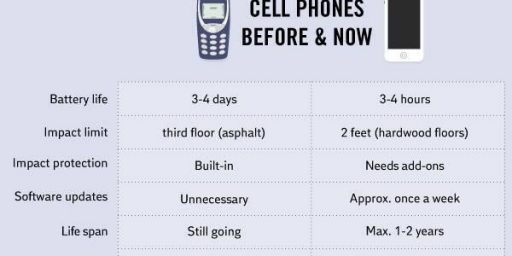Landline Phones Going Extinct
The landline telephone is going the way of the dinosaur, with many households doing away with them entirely and others using them only as FAX lines.
For nearly three in 10 households, don’t even bother trying to call them on a landline phone. They either only have a cell phone or seldom if ever take calls on their traditional phone. The federal figures, released Wednesday, showed that reliance on cells is continuing to rise at the expense of wired telephones. In the second half of last year, 16 percent of households only had cell phones, while 13 percent also had landlines but got all or nearly all their calls on their cells.
The number of wireless-only households grew by 2 percent since the first half of last year. Underscoring the rapid growth, in early 2004 just 5 percent had only cell phones. Households with cell phones who rarely if ever use their landlines grew by 1 percent since the first half of last year.
[…]
The survey also found that:
_Low-income people are likelier than the more affluent to have only cell phones.
_Those with only cells tend to be living with unrelated roommates, renters rather than homeowners, and Hispanics and blacks rather than whites.
_About a third of those under age 30 only have cell phones.
_Households with both cell and landline phones who rarely or never get calls on their landlines tend to be better educated and have higher incomes.
_About 2 percent of households reported having no telephones.
Since a cell phone is moving into the range of necessity rather than luxury, it makes sense that the poor are the first to give up their landlines and that the affluent would be most likely to hang onto them even while rarely using them. I suspect the other demographic information (age and race/ethnicity) merely restates those trends rather than providing separate information.
My wife and I are certainly in the own both but seldom use landline camp. We need a phone line for FAX transmissions and because we subscribe to fiberoptic Internet and television transmission (FiOS). We’d likely have it anyway, though, for peace of mind, 911 calls, and convenience.






I’m not sure this is a good thing. Cells have been known to suffer from peak load problems during emergencies or, said another way, they’re pretty likely to be useless when they’re needed most.
Dave,
Which is why the more affluent would tend to have both rather than just the cell.
The bigger impact is how this impacts polling. If you believe the hype that this is the year that youth voters will actually show up (and haven’t already put all your ready cash into the purchase of a bridge in Brooklyn), then 30% of under 30 not being accessible to random digit dialing that is seeded by the area and prefix code could have a huge impact on polling results.
YAJ,
Cell phones can still be categorized by area code, for the most part, and local number portability has been around long enough that I wouldn’t trust the prefix for location data anymore anyway. If anything, people with cell phones should be easier to reach, since they usually have their phones on them when they leave the house.
I have a question; if lower income households are doing away with their landlines, what are they doing for an Internet connection? I don’t think many lower income families are ponying up the money for cable-based Internet service, especially if they by keep their landing they can get access for free.
As for me and the hubby, we’ve been using our cells as our main numbers for years. We do still have a landline, mostly for our broadband connection. It just seemed easier to give out the numbers to the phones we always have with us, as opposed to giving out the number of the phone we’re not in rage of for 8-10 hours a day.
Uhh… why do you assume that they even have internet access?
The Dallas Morning News reports this morning that nearly 20% of US households have no internet access.
http://techblog.dallasnews.com/archives/2008/05/some-households-using-cell-pho.html
These households are likely to be elderly and low income.
Michael, I have both (although I did migrate my business landline to wireless). On my landline, I have caller ID, and if it shows up as Out of Area, or Toll Free, or Private Caller, I don’ pick up. If the caller is someone wants to actually talk with me, they will leave a message. I never get those calls on my cell.
IP Telephone service is incrementally not that expensive to provide over a broadband connection. Assuming wired broadband remains the norm, landlines may make a comeback over time as their prices come down and the service ends up as part of the bundle you get with your broadband. Anyway, for now I’m keeping both.
I’ve been purely digital (cell, cable modem, DirecTV) since 2004 when I bought my house. Oddly enough, depending on the specific tech, I may have to ‘devolve’ a bit and put in a landline when I upgrade to HDTV – but only because some (all?) DirecTV DVRs require the telephone connection to handle multiple shows simultaneously.
Missing from discussion so far: cost.
Land line circa $25 per month, “local” only.
Cell phone: $12 per month (and the phone was free as I was willing to accept a two-year-old model). Yes, every call costs – but as an elderly, under 18k/year guy that counts. After all, I make perhaps six calls per year.
And I can have it with me in case of emergency. Even if 911 or 0-perator connects me to someplace wierd, I am more likely to have my message forwarded to actual help than if I were to whimper to the ground.